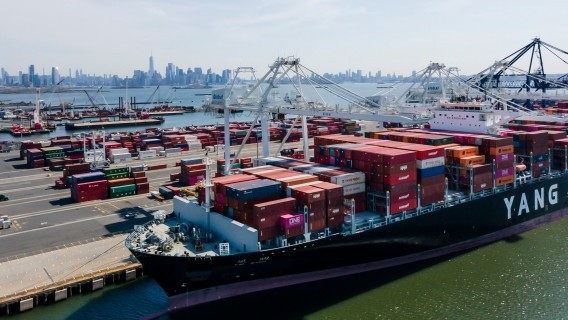Maritime industry experts are projecting a surge in freight rates and insurance charges—known as war risk premiums—following the move by Iranian military forces on Saturday to seize a commercial container ship near the Strait of Hormuz.
The increases would be similar to price hikes that happened in January when many ocean freight carriers began to avoid the Red Sea and the Suez Canal in an effort to dodge missiles and drones being launched by Houthi rebels in Yemen. But the latest incident could trigger a more global response, affecting oil prices, shipping routes, and energy security.
In the latest example of regional violence rippling out from Israel’s war with Hamas and Palestine, Iranian Navy special forces used a helicopter to forcefully board the MSC Aries, which is operated by maritime giant MSC but owned by an Israeli company, according to published reports. The seizure happened the same day that Iran fired hundreds of drones and missiles against Israel in retaliation for Israel’s earlier raid on the Iranian consulate in Syria.
As the violence continues to spread, worried stakeholders are preparing for potential impacts on global trade and shipping markets, according to a report from Container xChange, which operates an online platform for container trading and leasing.
“Regardless of immediate outcomes, we anticipate heightened uncertainty in shipping markets. This comes at a time when tensions have already been simmering since the end of November, particularly in the Bab-al-Mandab strait and the Red Sea. Now, the Strait of Hormuz emerges as a new focal point, with significant implications for Dubai, specifically Jebel Ali, a core transhipment hub in the region,” Christian Roeloffs, cofounder and CEO of Container xChange, said in a release.
The recent events are likely to have greatest impact on global oil markets, affecting oil prices, shipping routes, and energy security worldwide, since the Strait of Hormuz is one of the world’s most strategically significant chokepoints, connecting the Persian Gulf with the Gulf of Oman and the Arabian Sea, the report said.
But the events could also harm container markets by inflating shipping prices. “We anticipate that freight rates may rise in response to the increased tension and uncertainty. Furthermore, while the possibility of diversions around the region, potentially impacting hubs like Jebel Ali, exists, we believe it’s unlikely given the hub’s importance in global shipping networks,” Roeloffs said.
In fact, cargo ships had already begun routing away from the region before Iran’s action on Saturday, according to Windward, a company that provides maritime risk management services. For the week prior to the seizure there was a 450% increase in destination updates in the Arabian Gulf, Windward said. Vessels began showing patterns of evasion like vessels traversing the Red Sea with notices like “armed guards on-board”, “no connection to Israel”, and “all crew Chinese/Syrian/Russian”. Some vessels made U-turns in the area and some of them drifted in a “wait and see” pattern.
In response, companies should bolster their risk management strategies, incorporating comprehensive contingency plans that ensure flexibility and adaptability in the face of geopolitical instabilities, according to advice from Moody’s Analytics, the market analysis firm.
“The recent attacks by Iran on Israel once again leave uncertainty lingering over global supply chains. These events highlight the fragile nature of international trade, particularly within a region that plays a critical role in the provisioning of the world’s oil,” Vitaliano Tobruk, Supplier Risk Management – Industry Practice Lead at Moody’s, said in a statement. “The looming risk of a shutdown of the Persian Gulf – coupled with recent attacks on ships in the Red Sea – would drive even more ocean freight volume via the Cape of Good Hope and further extend lead times.”
(Source : dc velocity)

